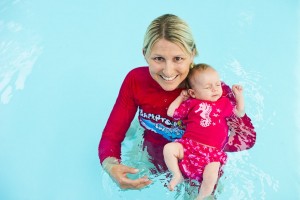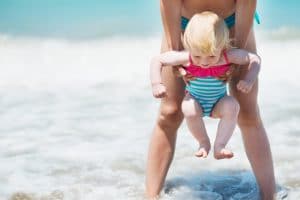
Water safety:
The number one reason for participation in swim lessons is drowning prevention. Whilst it is well-known that children who attend swim lessons are still at risk of drowning, many are not aware of a 2009 study by the USA’s National Institute of Health which concluded that ‘participating in formal swimming lessons was associated with an 88% reduction in the risk of drowning in children aged between 1 and 4 years.’
This statistic recognises that children who attend swim lessons are safer in and around water; perhaps stemming from their increased awareness of their capabilities and limitations in the water, and being able to put into practise water safety skills learnt from swim lessons, such as not entering the water without a parent or being suitably dressed in swim attire. However, parents need to be aware that swim lessons alone do not 100% eliminate the risk of drowning.
Adding Capital:
There are huge developmental advantages of taking a baby swimming from a very young age. The findings of a recent 4-year research project (2010-2013) led by Griffith University demonstrated ‘considerable differences across a range of skills’ between those that did not attend formal swim lessons versus children who participated.
“These differences are related not only to physical development – as would be expected by an activity such as swimming – but also in areas of cognition, social skills, linguistics and language” lead researcher Professor Robyn Jorgensen said.
“The study also showed considerable differences between normal developmental milestones and when swimming children achieve them, regardless of socio-economic background.”
According to the research, swimming children were anywhere from 6 to 20 months ahead of the normal population when it came to cognitive skills, problem solving, counting, oral expression, story recall, language and following instructions.
With many of these skills being highly valuable in other learning environments, including as young children transition into pre-school and schools, investment in early swim lessons can be said to assist your child capital in order to reach their full potential.
Health:
Swimming is a complete physical workout for babies, which in turn assists their heart, lung and muscular development. The physical activity that swimming offers stimulates the appetite, which in turn promotes food digestion and boosts the immune system.
Regular swimming also aids in the development of sleep patterns. One reason parents love to have their baby in swim lessons is for the deeper and longer sleep that invariably follow a swim session. Even though the class may appear gentle and relaxing, your baby very often exerts themselves within the short timeframe of the class.
The myriad of activities, faces, free movement, splashing and noise (laughing/songs) also stimulates baby’s brain, which in turn assists in sight, hearing, touch, balance and coordination development of baby.
The freedom that water provides allows a baby to exercise more muscles than they could possible expect to use on land. We know that movement is crucial to development, so the expanded opportunity for movement available in an aquatic environment afford a further opportunity for infant brain development.
Additional benefits include the self-esteem and sense of independence that are produces when baby learns to move themselves through the water.
Bonding:
Swimming lessons are a wonderfully intimate activity between parent and child that provide a one-on-one bonding opportunity, which helps promote the parent-infant relationship. This half hour of uninterrupted joy is highlighted by parents being able to witness powerful ‘I can do it’ moments from their little ones.
The group class structure of swim lessons provides a chance for interaction with instructors and other children and parents, and enhances a child’s social skills and ability to build relationships.
No Fear Here:
Having spent 9 months suspended in the warm fluid of a mother’s womb, newborn babies have a natural affinity with the water. However, as they become older and with less exposure, babies can lose their inherent love of the water and become fearful.
Babies who swim from an early age are more relaxed and confident in the water, and commencing swim lessons at an early age can assist in avoiding the emotional stress that may accompany commencing lessons at an early age.
Baby swim lessons are so much more than just ‘another activity’; aiding in whole child development, providing parent and baby with a unique experience and offering a sense of pride and achievement as skills are developed and achieved over the course of lessons. More importantly, swimming lessons assist baby in developing a skill for life, potentially aiming them with the skills to decrease their risk of drowning.
About the Author: Hampton Swim School was established by Julia Ham, a former Australian Swimming representative, in 1999. In between her gruelling training schedule, Julia found a passion for swimming at the grassroots level as a learn to swim instructor. At Hampton Swim School we believe that aquatic education can contribute to saving your child’s life.













